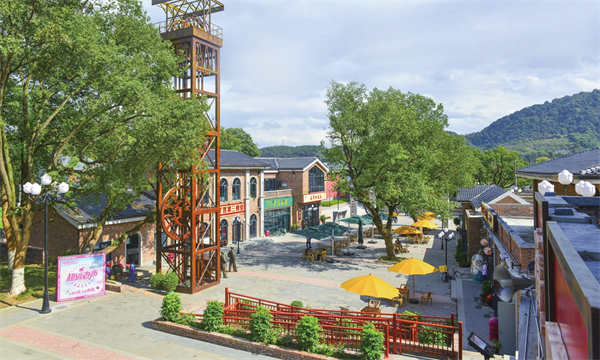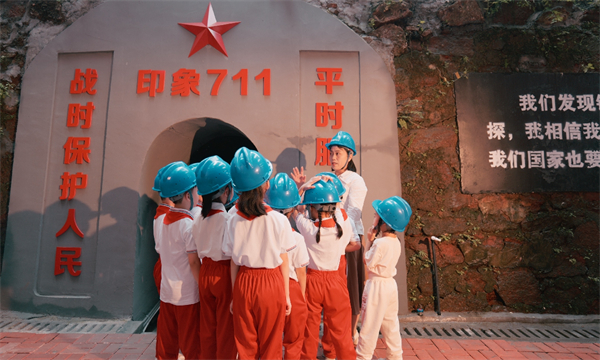Meritorious industrial heritage becomes key site for youth education
2024-06-10

A view of the 711 Time Town Photo: Courtesy of China National Nuclear Corporation
Stepping into the 711 Time Town in Chenzhou, Central China's Hunan Province, it feels like a journey back in time to the mid-20th century China with its Soviet-style red walls and black tile roofs, vintage shops, and factory club. But as you delve deeper, you will discover that time hasn't stood still.
Surprisingly, a new scene of vigor and vitality has emerged, attracting people to listen to old songs, and browse through yellowed photos. Immersed in the past, visitors experience China's nuclear industry's challenging development journey, and witness the country's technological breakthroughs as it gained confidence in its progress.
This stunning town was transformed from a mysterious decommissioned 711 Uranium Mine.
Established in 1958, the 711 Uranium Mine played a crucial role in China's nuclear industry, supplying materials for the country's first atomic bomb, hydrogen bomb and nuclear submarine.
In 2023, the retired merit uranium mine site was "restarted" as one of China's first batch of ideological and political education practice bases, preserving its status as a national industrial cultural heritage site.
While the mine has fulfilled its historical mission, it now serves as a spiritual beacon of patriotism, illuminating the path for future generations.
At present, the transformation of industrial heritage sites like the 711 Time Town into educational hubs has gained popularity in China. It is not only a good witness of historical events, a protector of the revolutionary spiritual resources of the Communist Party of China, but also a good inheritor of the great spirit. It stands as a testament to the country's progress and a symbol of its industrial heritage's rebirth.

Students participate in a patriotism education camp at the 711 Time Town on May 12, 2024. Photo: Courtesy of Hu Hai
Emotional resonance
The 711 Time Town came more vibrant on May 28 with a captivating class titled "Immortal Merits - From Jinyinzhai to Jinyintan Grassland." Through the use of videos, music, the class brought to life the touching history of the 711 Uranium Mine, China's first large-scale uranium mine: Located in the remote mountains of Jinyinzhai, experts, engineers, and builders from all over China worked tirelessly in the 1950s to extract uranium ore, eventually providing the qualified nuclear materials in April 1960, for China's first atomic bomb explosion.
The historic achievement of China's first atomic bomb exploding on a mountain-high grassland called Jinyintan in Northwest China's Qinghai Province on October 16, 1964 marked a significant milestone in China's international status.
As the 60th anniversary of this event approaches in 2024, attendees of the ideological-political course were deeply moved by the immersive experience, feeling a strong emotional resonance with the fine traditions of hard work, selfless dedication, unity, cooperation, and innovation.
"I had only read about the story of China's atomic bomb explosion in books before, but the experience on-site was completely different. I was even trembling with excitement!" shared Zhang Ziwen, a 10-year-old elementary school student, with the Global Times.
According to Zhou Liping, executive vice president of the Chenzhou Suxian District Party School, the creative team behind the special course put in a tremendous amount of effort to make the class, consulting the massive data related to the mine. Since its inception in September 2023, the class has attracted over 10,000 visitors who have made reservations to attend, eager to learn and experience the history of the 711 mine firsthand.
Not too far from the mine, the old state-owned 711 mine school has undergone a makeover and is now a bustling research and education camp.
"We've revamped the old air-raid shelter to bring back the gatekeeper's room, command center, laboratory, and grain storage room that once thrived underground at the mine. We've even brought back former 711 miners to share their tales from the past," said Hu Hai, founder of 711 Patriotism Education Camp.

Children pose for a group photo at a patriotic education camp in 711 Time Town, on May 28, 2024. Photo: Lin Xiaoyi/GT
Courses in practice
"When people respect and advocate heroes, more heroes will emerge." Chinese President Xi Jinping's words have been mentioned on many occasions across 711 Time Town.
"Industrial heritage cannot thrive if it is only used as a backdrop for photos. We aim to tell the stories behind industrial heritage and bring out its cultural significance. We want to embody the spirit of the 711 miners who did extraordinary things but remained anonymous," Hu said.
At a meeting on boosting the development of ideological-political courses for schools held in Beijing on May 11, President Xi has stressed efforts to continuously break new ground in ideological and political education at schools in the new era.
Schools of various types should consistently break new ground in ideological and political education in the new era, and foster talented individuals who are loyal to the Party, patriotic and dedicated, and capable of shouldering the mission of realizing national rejuvenation, Xi said.
"The power of the mind knows no bounds, and we also make efforts to lead ideological and political education courses go beyond the confines of traditional classrooms," said Hu.
China National Nuclear Corporation (CNNC) is now using its rich cultural heritage and technological advancements, such as the site of 711 Uranium Mine and the research and development base for China's first nuclear submarine, to create comprehensive and specialized exhibition halls. In conjunction with the nuclear industry cultural research and study system curriculum, CNNC also hold special lectures, seminars, on-site teaching courses, and carry out a series of activities with solemnity and educational significance, widely promoting the spirit of Chinese nuclear industry.
Participating in a variety of "ideological-political courses in practice" has also become a popular activity for young people looking to strengthen their ideals and beliefs.
On May 29, students and teachers from the School of Marxism at Lanzhou University, took a trip to the Liujiaxia Hydropower Plant for a hands-on ideological and political class experience. They explored the dam, power plant, and company culture room, getting a firsthand look at how the older generation of builders overcame immense challenges to construct the largest hydropower station in Asia at the time.
The construction of the Liujiaxia Hydropower Station tells the story of China's industrial civilization transformation and upgrade, showcasing the spirit of self-reliance and hard work that defined the early days of New China, said Lin Zeyu, a recent graduate of the School of Marxism at Lanzhou University.
"This experience has made me even more determined and confident in my role in Chinese modernization," he said.




